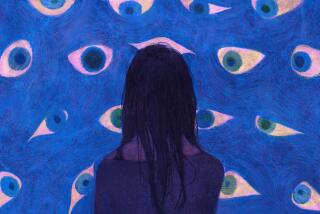A Life in Full
- Share via
He was a young man more of body than of soul. Tom Weigel wanted to be a lumberjack, the strongest man alive, and little more. In 1965, he moved to Montana, a state that could test such hardy mettle, but an accidental shotgun blast sent him on a new course.
The daggered chill and unsettled terrain, the rugged mountains he found were not of Montana--they were within him. He was 19, a high school dropout. Blind.
“What am I going to do now?” he wondered. It was almost a prayer.
He was drawn first to the familiar. Upon his release from the hospital, he returned to the family farm outside Napoleon, N.D. He milked the cow he had raised from a calf, slept in the bed where he had dreamed old dreams. He realized that new ones would require more than an ax and strong shoulders.
He learned to read with his hands, to walk with a cane. One day during his rehabilitation, he disassembled the motor of an old washing machine, removing each screw until no two pieces were connected. Then he began to rebuild.
To his surprise, it started right up when he was finished. If he could rebuild a motor, he thought, he could rebuild much more.
So he returned to school and earned his GED, which in 1970 led to trade school in Los Angeles, where he learned the mechanics, the feel and sounds of small engines.
Now 54, he is an equipment maintenance worker at County-USC Medical Center, where he has worked for 19 years.
“He can pull a motor in five minutes,” says Ward Archer, a co-worker of 10 years. “He constantly amazes me. He’s hard-headed, won’t give up. He’ll fix things I won’t even try, stuff that nobody else will try, just to prove he can do it.”
*
About the only tasks he can’t perform are those involving color-coded electrical wiring. “If we could do that,” Weigel says, “a lot of sighted people wouldn’t be able to find jobs.”
It should not be surprising that he can do such work, Weigel says. To lose eyesight is not to become inept. It is to become resourceful. It is to learn to see in new ways. And to be seen in new ways.
His appearance, at times, has caused children to keep their distance. Some adults, too, are unsettled by his missing eye and have asked him to keep his dark glasses on. He says he is not bothered by such reaction.
“I learned that it’s what’s in the heart that matters,” he says.
He has learned also about “blessings in disguise,” which is how he views the incident in which a friend, mistaking him for an intruder, fired a gun through a window as Weigel was reaching for the door. Blindness, Weigel says, led him to faith.
“I think that because of my blindness, I became a Christian,” he says. “It led me to the Bible.”
In many ways, he says, he was blind before he lost sight.
Clemen Weigel, his wife of 12 years, had never known a blind person before meeting Weigel. When their relationship started to become serious, she was hesitant. A single parent, she wondered how she could take on the added responsibility of caring for a blind man.
Her concern disappeared as she realized how few his limitations were and that he was a giver, not a taker.
“He sees more than people who are not blind,” she says.
They trust each other wholeheartedly, as evidenced by the fact that he taught her how to drive. “We went right out on the freeway,” she says. “It was scary for me, but I think it was more scary for him.”
When they watch movies, she describes settings for him, but there are things she wishes he could see with his own eyes.
“We went to a wedding once and his whole family was there,” she says. “It made me sad that he couldn’t see them.”
*
He has never seen his four sons from a previous marriage or his stepson, a senior at Cal State Northridge, who works on cars with him at home. Nor has he seen his wife.
“I tell him no,” Clemen says--”that if he saw me, he would wish to be blind again.”
Faces he once knew have faded from memory. It has been too long, he says, since he has seen them. But he remembers beauty. He recalls the bus ride to Montana, looking out the window and seeing horses, their strength evident in each stride, as they galloped through vast, open spaces.
“They gave me a feeling of freedom,” he says.
Weigel does not dwell on what he cannot see. There is no bitterness in his heart. His life, he says, is full.
“Being blind isn’t the worst thing that can happen to a person. It’s not the worst thing in life. I work, I have a regular job, support my family. You don’t have to see to do that.”
And, sometimes in his memory, mountains still beckon, horses still run. And, once again, he is free.
More to Read
Sign up for Essential California
The most important California stories and recommendations in your inbox every morning.
You may occasionally receive promotional content from the Los Angeles Times.













